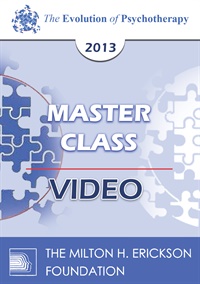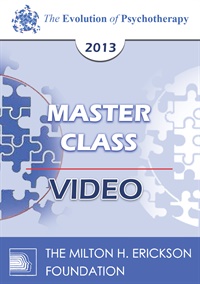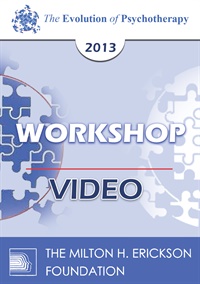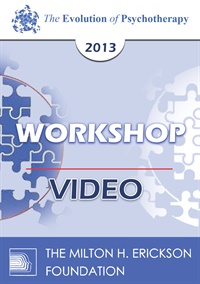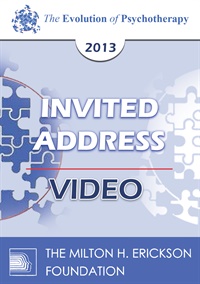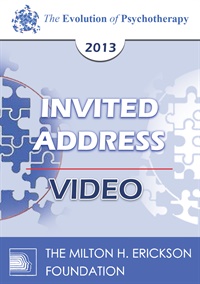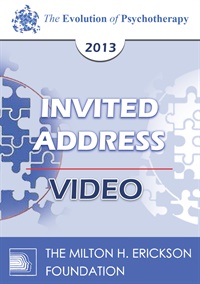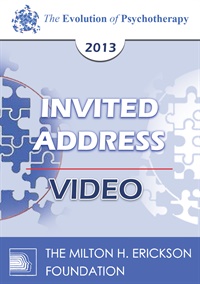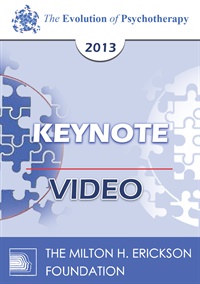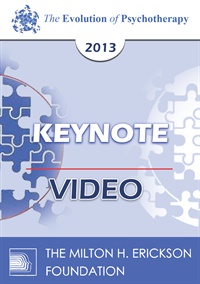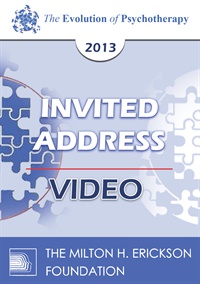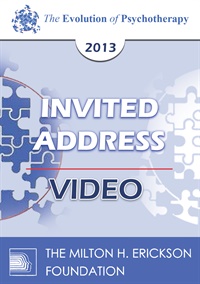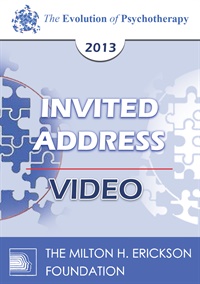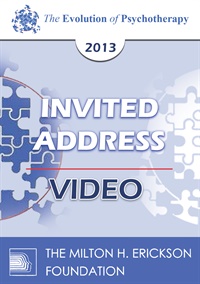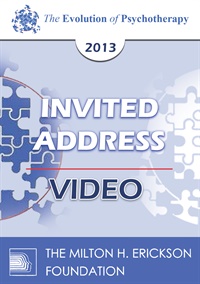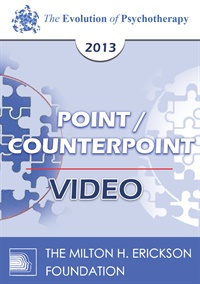- Average Rating:
- Not yet rated
- Topic Areas:
- Master Classes | Brief Therapy | Experiential Therapy | Gestalt | Hypnosis | Psychotherapy
- Categories:
- Evolution of Psychotherapy | Evolution of Psychotherapy 2013
- Faculty:
- Jeffrey Zeig, PhD | Erving Polster, PhD
- Course Levels:
- Master Degree or Higher in Health-Related Field
- Duration:
- 2:34:54
- Format:
- Audio and Video
- Original Program Date:
- Dec 16, 2013
- Short Description:
- Gestalt therapy and Ericksonian hypnotherapy are experiential methods of change. In combination they can be synergistic. Psychotherapy is best when clients have a first-hand experience of an alive therapeutic process. Such dynamic empowering experiences pave the way for dynamic understandings. Drs. Polster and Zeig will engage with each other and the participants to examine commonalities and differences in their work.
- Price:
-
Sale is $29.00
price reduced from Base Price - $59.00
- Average Rating:
- Not yet rated
- Topic Areas:
- Master Classes | Brief Therapy | Experiential Therapy | Gestalt | Hypnosis | Psychotherapy
- Categories:
- Evolution of Psychotherapy | Evolution of Psychotherapy 2013
- Faculty:
- Jeffrey Zeig, PhD | Erving Polster, PhD
- Course Levels:
- Master Degree or Higher in Health-Related Field
- Duration:
- 2:28:01
- Format:
- Audio and Video
- Original Program Date:
- Dec 16, 2013
- Short Description:
- Gestalt therapy and Ericksonian hypnotherapy are experiential methods of change. In combination they can be synergistic. Psychotherapy is best when clients have a first-hand experience of an alive therapeutic process. Such dynamic empowering experiences pave the way for dynamic understandings. Drs. Polster and Zeig will engage with each other and the participants to examine commonalities and differences in their work.
- Price:
-
Sale is $29.00
price reduced from Base Price - $59.00
- Average Rating:
- Not yet rated
- Topic Areas:
- Workshops | Domestic Violence | Group Therapy | Psychotherapy | Gottman Method | LGBTQ
- Categories:
- Evolution of Psychotherapy 2013 | Evolution of Psychotherapy
- Faculty:
- John Gottman, PhD | Julie Gottman, PhD
- Course Levels:
- Master Degree or Higher in Health-Related Field
- Duration:
- 1:38:39
- Format:
- Audio and Video
- Original Program Date:
- Dec 15, 2013
- Short Description:
- Current meta-analysis by Julia Babcock shows that same-sex group treatment for domestic violence is ineffective. Couples treatment is illegal in many states. We will present the results (and methods) for treating only situational (not characterological) domestic violence that shows high effectiveness with lasting effects after 18 months. Treatment utilizes Gottman-method curriculum with 21 sessions of couples group work.
- Price:
-
Sale is $29.00
price reduced from Base Price - $59.00
- Average Rating:
- Not yet rated
- Topic Areas:
- Workshops | Hypnosis | Psychotherapy
- Categories:
- Evolution of Psychotherapy 2013 | Evolution of Psychotherapy
- Faculty:
- Michael Yapko, PhD
- Course Levels:
- Master Degree or Higher in Health-Related Field
- Duration:
- 1:48:06
- Format:
- Audio and Video
- Original Program Date:
- Dec 15, 2013
- Short Description:
- Is there any doubt that people learn more easily through experience when they’re focused and receptive? Or that growth is easier when rigid perceptions and boundaries of experience are softened and redefined? Hypnosis highlights the malleability of subjective experience and empowers people to live their best lives. In the past, hypnosis was considered by many to be the “crazy cousin nobody wanted at the therapy family picnic.” But, as the contributions of hypnosis in neuroscience (especially neurogenesis and neuroplasticity), epigenetics, clinical effectiveness, and interpersonal dynamics have steadily grown in importance, hypnosis can be identified as a core component of good therapy in whatever form it may be delivered.
- Price:
-
Sale is $29.00
price reduced from Base Price - $59.00
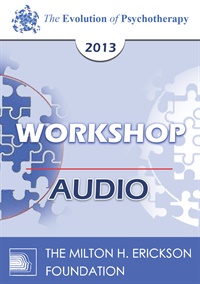
- Average Rating:
- Not yet rated
- Topic Areas:
- Workshops | Life Focus Community | Psychotherapy
- Categories:
- Evolution of Psychotherapy | Evolution of Psychotherapy 2013
- Faculty:
- Erving Polster, PhD
- Duration:
- 1 Hour 28 Minutes
- Format:
- Audio Only
- Original Program Date:
- Dec 15, 2013
- Short Description:
- A compelling social ethos beckons psychotherapy to expand beyond pathology into the way people live their everyday lives. This workshop will illuminate psychotherapy’s inherent thrust toward the communal: people joining together to explore universal issues of living; naming themes; developing novel formats, and introducing life-defining exercises. This will include a live communal demonstration.
- Price:
- $15.00 - Base Price
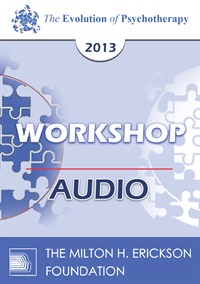
- Average Rating:
- Not yet rated
- Topic Areas:
- Workshops | Metaphors | Pain and Healing | Psychotherapy | Resources
- Categories:
- Evolution of Psychotherapy | Evolution of Psychotherapy 2013
- Faculty:
- Robert Dilts, BA
- Duration:
- 2 Hours
- Format:
- Audio Only
- Original Program Date:
- Dec 15, 2013
- Short Description:
- The late Gabrielle Roth, founder of the 5 Rhythms movement practice, was a quintessential woman of the body and sometimes called an “urban shaman.” Gregory Bateson was an iconic man of the mind and a foundational contributor to most modern methods of systemic therapy. Bateson and Roth interacted at Esalen in the legendary times during the late 1970s and Bateson encouraged Roth to bring her creation into the world. This workshop will explore the work of these two pioneers and how to integrate movement and mind to create generative resources for change and healing.
- Price:
- $15.00 - Base Price
- Average Rating:
- Not yet rated
- Topic Areas:
- Workshops | Feedback Informed Treatment (FIT) | Relationships | Tailoring | Therapeutic Relationship | Therapist Development
- Categories:
- Evolution of Psychotherapy | Evolution of Psychotherapy 2013
- Faculty:
- Scott Miller, PhD
- Course Levels:
- Master Degree or Higher in Health-Related Field
- Duration:
- 1:11:21
- Format:
- Audio and Video
- Original Program Date:
- Dec 15, 2013
- Short Description:
- It’s not a pretty picture. Available evidence indicates that the effectiveness of psychotherapy has not improved in spite of 100 years of theorizing and research. What would help? Not learning a new model of therapy. And no, not attending another CEU event or sorting through that stack of research journals by your desk. A simple, valid, and reliable alternative exists for maximizing the effectiveness and efficiency of treatment based on using ongoing client feedback to empirically tailor services to the individual client’s needs and characteristics. The Substance Abuse and Mental Health Services Administration recently deemed feedback informed treatment (FIT) an evidence-based practice.
- Price:
-
Sale is $29.00
price reduced from Base Price - $59.00
- Average Rating:
- Not yet rated
- Topic Areas:
- Workshops | Social Psychology | Psychotherapy | Psychology
- Categories:
- Evolution of Psychotherapy 2013 | Evolution of Psychotherapy
- Faculty:
- Bill O'Hanlon, MS
- Course Levels:
- Master Degree or Higher in Health-Related Field
- Duration:
- 1:40:33
- Format:
- Audio and Video
- Original Program Date:
- Dec 15, 2013
- Short Description:
- Marketers are learning about and using the latest research on how to persuade people to change their views and behavior, but psychotherapists generally don’t know about or use this research. This session, using videos, audios and stories to bring the material alive, will teach you three powerful methods for radically increasing cooperation in therapy.
- Price:
-
Sale is $29.00
price reduced from Base Price - $59.00
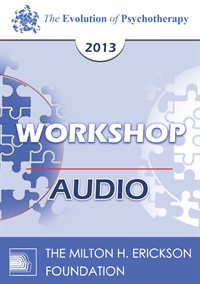
- Average Rating:
- Not yet rated
- Topic Areas:
- Workshops | Art and Creativity | Psychotherapy | Utilization | Communication
- Categories:
- Evolution of Psychotherapy | Evolution of Psychotherapy 2013
- Faculty:
- Jeffrey Zeig, PhD
- Duration:
- 1 Hour 43 Minutes
- Format:
- Audio Only
- Original Program Date:
- Dec 15, 2013
- Short Description:
- Language is both informative and expressive. It is the expressive component that elicits changes in emotion, sensation, “state,” and physiology; the words only convey part of the message. We will study the effective use of prosody, proximity, gesture, expression and context, and how those channels can be woven into the process of communication to create dramatic moments that empower effective clinical outcomes. Lecture, demonstration, small group practice.
- Price:
- $15.00 - Base Price
EP13 Invited Address 17 – Motivational Interviewing and The Language of Change – William Miller, PhD
- Average Rating:
- Not yet rated
- Topic Areas:
- Invited Addresses | Interviewing | Therapist Development | Motivation | Psychotherapy
- Categories:
- Evolution of Psychotherapy | Evolution of Psychotherapy 2013
- Faculty:
- William Miller, PhD
- Course Levels:
- Master Degree or Higher in Health-Related Field
- Duration:
- 53:56
- Format:
- Audio and Video
- Original Program Date:
- Dec 15, 2013
- Short Description:
- Motivational interviewing facilitates a natural process of “talking oneself into change.” Dr. Miller will provide an overview of the clinical method of motivational interviewing and its underlying psycholinguistic processes, based on recent research linking therapist and client in-session speech to behavioral outcomes. These dynamics appear to predict successful outcomes across a variety of psychotherapies.
- Price:
-
Sale is $29.00
price reduced from Base Price - $59.00
- Average Rating:
- Not yet rated
- Topic Areas:
- Couples Therapy | Invited Addresses | Communication | Conflict | Psychotherapy
- Categories:
- Evolution of Psychotherapy | Evolution of Psychotherapy 2013
- Faculty:
- Harville Hendrix, PhD
- Course Levels:
- Master Degree or Higher in Health-Related Field
- Duration:
- 58:14
- Format:
- Audio and Video
- Original Program Date:
- Dec 15, 2013
- Short Description:
- In the old way of thinking, stressed couples were depicted as a failed communication system of interacting pathologies that could be improved by therapists dispensing conflict resolution skills. In the new way of thinking, couples are the source of mutual healing and the fulcrum for social transformation. This lecture will discuss how that shift occurred and its implications, not only for the happiness of couples, but for the relational well-being of society.
- Price:
-
Sale is $29.00
price reduced from Base Price - $59.00
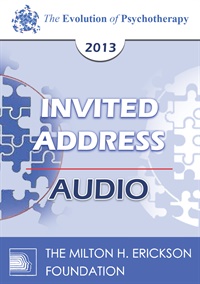
- Average Rating:
- Not yet rated
- Topic Areas:
- Psychotherapy | Invited Addresses
- Categories:
- Evolution of Psychotherapy | Evolution of Psychotherapy 2013
- Faculty:
- Steven Hayes, PhD
- Duration:
- 59:25
- Format:
- Audio Only
- Original Program Date:
- Dec 15, 2013
- Short Description:
- In this talk Dr. Hayes argues that human beings evolved for compassion and cooperation, based in part on the impact of eusociality on human language. This view has extraordinary implications for how we can achieve peace of mind, placing perspective taking and compassion at the center of psychotherapy itself. Such a view has the exciting possibility of bringing together different traditions in psychotherapy that often consider themselves rivals.
- Price:
- $15.00 - Base Price
Tags: Compassion Psychotherapy
- Average Rating:
- Not yet rated
- Topic Areas:
- Invited Addresses | Children and Adolescent Therapy | Psychotherapy
- Categories:
- Evolution of Psychotherapy | Evolution of Psychotherapy 2013
- Faculty:
- Violet Oaklander, PhD
- Course Levels:
- Master Degree or Higher in Health-Related Field
- Duration:
- 56:22
- Format:
- Audio and Video
- Original Program Date:
- Dec 15, 2013
- Short Description:
- All children are born with the capacity to develop and use all of the aspects of the organism to live healthy, productive, joyful lives. We know that trauma interrupts the healthy development of the child. There also are some very basic developmental aspects that further thwart healthy development. An understanding of these hindrances is the first step toward helping children heal.
- Price:
-
Sale is $29.00
price reduced from Base Price - $59.00
Tags: Children Psychotherapy
- Average Rating:
- Not yet rated
- Topic Areas:
- Psychotherapy | Invited Addresses | Personality Disorders | Psychopharmacology
- Categories:
- Evolution of Psychotherapy | Evolution of Psychotherapy 2013
- Faculty:
- Nicholas Cummings, PhD
- Course Levels:
- Master Degree or Higher in Health-Related Field
- Duration:
- 54:12
- Format:
- Audio and Video
- Original Program Date:
- Dec 15, 2013
- Short Description:
- In the age in which psychotropic medications have largely replaced psychotherapy, or medications are primary when psychotherapy is included, this presentation will demonstrate how psychotherapy alone can take precedence over medications, and achieve better outcomes than are currently being seen in our failing mental health system.
- Price:
-
Sale is $29.00
price reduced from Base Price - $59.00
- Average Rating:
- Not yet rated
- Topic Areas:
- Keynotes | Psychotherapy | Cognitive Behavior Therapy (CBT) | History of Psychotherapy
- Categories:
- Evolution of Psychotherapy | Evolution of Psychotherapy 2013
- Faculty:
- Aaron Beck, MD
- Course Levels:
- Master Degree or Higher in Health-Related Field
- Duration:
- 1:02:55
- Format:
- Audio and Video
- Original Program Date:
- Dec 15, 2013
- Short Description:
- The discussion will center on the evolution of the cognitive model of psychopathology and psychotherapy since its earlier stage. The expansion of therapy has included all of the common disorders and many of the medically related disorders will be explored. Finally, we will focus on the future of cognitive therapy and psychotherapy in general. Special attention will be paid to the relationship of other psychotherapies.
- Price:
-
Sale is $29.00
price reduced from Base Price - $59.00
- Average Rating:
- Not yet rated
- Topic Areas:
- Psychology | Keynotes | Positive Psychology | Psychotherapy
- Categories:
- Evolution of Psychotherapy | Evolution of Psychotherapy 2013
- Faculty:
- Martin Seligman, PhD
- Course Levels:
- Master Degree or Higher in Health-Related Field
- Duration:
- 57:25
- Format:
- Audio and Video
- Original Program Date:
- Dec 15, 2013
- Short Description:
- Positive Psychology measures and attempts to build PERMA: Positive Emotion, Engagement, Relationships, Meaning, and Accomplishment. I present recent findings from individuals, the clinic, organizations, and nations, as well as evidence-based techniques for building PERMA.
- Price:
-
Sale is $29.00
price reduced from Base Price - $59.00
- Average Rating:
- Not yet rated
- Topic Areas:
- Couples Therapy | Divorce | Invited Addresses | Psychotherapy | Brief Therapy | Conflict | Empathy | Strategic Therapy
- Categories:
- Evolution of Psychotherapy | Evolution of Psychotherapy 2013 | Pioneers in Couples and Family Therapy
- Faculty:
- Michele Weiner-Davis, LCSW
- Course Levels:
- Master Degree or Higher in Health-Related Field
- Duration:
- 59:12
- Format:
- Audio and Video
- Original Program Date:
- Dec 14, 2013
- Short Description:
- Many couples arrive in therapy feeling worn down, certain that nothing can change. This presentation explores how therapists can intervene at such moments to restore hope and possibility. Drawing from her “Divorce Busting” model, Weiner-Davis shares strategies for challenging resignation, addressing the walkaway wife dynamic, and encouraging proactive support for relationships—both in therapy and beyond. Moderator: Annellen Simpkins, PhD
- Price:
-
Sale is $29.00
price reduced from Base Price - $59.00
- Average Rating:
- Not yet rated
- Topic Areas:
- Invited Addresses | Social Issues | Psychotherapy | Trauma
- Categories:
- Evolution of Psychotherapy | Evolution of Psychotherapy 2013
- Faculty:
- Mary Pipher, PhD
- Course Levels:
- Master Degree or Higher in Health-Related Field
- Duration:
- 1:06:21
- Format:
- Audio and Video
- Original Program Date:
- Dec 14, 2013
- Short Description:
- We’ll explore the deluge tidal of information, including a great deal of traumatic information about the fate of Mother Earth, that all of us are confronted with daily. I’ll share the steps of a trauma-to-transcendence cycle that begins with awareness, leads to resilient coping, and then continues to a transcendent response. This cycle always involves action and creates hope.
- Price:
-
Sale is $29.00
price reduced from Base Price - $59.00
Tags: Trauma Social Issues Psychotherapy
- Average Rating:
- Not yet rated
- Topic Areas:
- Addiction | Trauma | Family Therapy | Invited Addresses | Psychotherapy | Co-Occurring Disorders | Family Systems
- Categories:
- Evolution of Psychotherapy | Evolution of Psychotherapy 2013 | Pioneers in Couples and Family Therapy
- Faculty:
- Claudia Black, PhD
- Course Levels:
- Master Degree or Higher in Health-Related Field
- Duration:
- 1:02:07
- Format:
- Audio and Video
- Original Program Date:
- Dec 14, 2013
- Short Description:
- When people think of trauma they often think of acute dramatic situations, such as a natural disaster or acts of terrorism. Yet, the majority of people who experience trauma experience a more subtle and chronic form that exists within their own family. Beginning with a genogram, Claudia Black, Ph.D., will give a portrait of addiction in the family, offering an overlay of how adverse child experiences, emotional abandonment and blatant violence are all aspects of the trauma.
- Price:
-
Sale is $29.00
price reduced from Base Price - $59.00
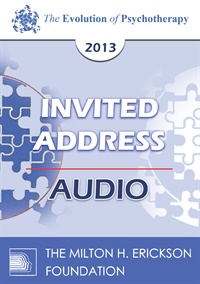
- Average Rating:
- Not yet rated
- Topic Areas:
- Psychology | Invited Addresses | Psychotherapy
- Categories:
- Evolution of Psychotherapy | Evolution of Psychotherapy 2013
- Faculty:
- David Barlow, PhD
- Duration:
- 58:07
- Format:
- Audio Only
- Original Program Date:
- Dec 14, 2013
- Short Description:
- For more than sixty years in clinical psychology we have attempted to integrate science into practice for the benefit of the public. After a brief review of the progress we have made and the reasons for the emergence of evidence-based practice, we will consider current barriers to dissemination and implementation. These include the relative (in) efficacy of current psychological interventions, issues of comorbidity and heterogeneity of psychopathology, the ambiguity concerning mechanisms of action in treatments, a continuing emphasis on nomothetic rather than idiographic methodology, and emerging issues of implementation in clinical settings.
- Price:
- $15.00 - Base Price
- Average Rating:
- Not yet rated
- Topic Areas:
- Couples Therapy | Invited Addresses | Love | Psychotherapy
- Categories:
- Evolution of Psychotherapy | Evolution of Psychotherapy 2013
- Faculty:
- Sue Johnson, EdD
- Course Levels:
- Master Degree or Higher in Health-Related Field
- Duration:
- 58:51
- Format:
- Audio and Video
- Original Program Date:
- Dec 14, 2013
- Short Description:
- EP13 Invited Address 12 – The New Science of Love: A New Era for Couple Interventions – Sue Johnson, EdD We have cracked the code of romantic love. We can precisely target interventions and shape the core defining moments of a love relationship. Adult attachment science offers a clear map to the creation of a secure lasting bond. New findings in neuroscience promise couple interventions that may be the most potent and far-reaching form of therapeutic intervention ever devised.
- Price:
-
Sale is $29.00
price reduced from Base Price - $59.00
- Average Rating:
- Not yet rated
- Topic Areas:
- Invited Addresses | Psychotherapy | Research | Resistance | Motivation
- Categories:
- Evolution of Psychotherapy | Evolution of Psychotherapy 2013
- Faculty:
- David Burns, MD
- Course Levels:
- Master Degree or Higher in Health-Related Field
- Duration:
- 59:00
- Format:
- Audio and Video
- Original Program Date:
- Dec 14, 2013
- Short Description:
- New research indicates that motivation influences how we think, feel, and behave, as much as cognitions, and that the failure to address resistance is the cause of most therapeutic failure. Dr. Burns will describe the eight most common forms of resistance and present powerful new techniques to melt away resistance before using any cognitive, behavioral, or interpersonal techniques.
- Price:
-
Sale is $29.00
price reduced from Base Price - $59.00
- Average Rating:
- Not yet rated
- Topic Areas:
- Invited Addresses | Therapist Development | Psychotherapy
- Categories:
- Evolution of Psychotherapy | Evolution of Psychotherapy 2013
- Faculty:
- Jon Carlson
- Course Levels:
- Master Degree or Higher in Health-Related Field
- Duration:
- 1:01:44
- Format:
- Audio and Video
- Original Program Date:
- Dec 14, 2013
- Short Description:
- According to some studies, 9 out of 10 clinicians describe themselves as “above average.” Although it is probably true that they would like to be viewed as a master or an above average therapist, it is unlikely. Most counseling students plan to be master therapists once they have put in the suggested 10,000 hours needed for mastery, but few reach this enlightened state. This program will describe the process that is necessary to achieve mastery in psychotherapy.
- Price:
-
Sale is $29.00
price reduced from Base Price - $59.00
- Average Rating:
- Not yet rated
- Topic Areas:
- Point/Counterpoint Sessions | Communication | Evocative Communication | Psychotherapy | Therapist Development | Art and Creativity
- Categories:
- Evolution of Psychotherapy | Evolution of Psychotherapy 2013
- Faculty:
- Jeffrey Zeig, PhD | Donald Meichenbaum, PhD | Kathryn Rossi, PhD
- Course Levels:
- Master Degree or Higher in Health-Related Field
- Duration:
- 1:29:19
- Format:
- Audio and Video
- Original Program Date:
- Dec 14, 2013
- Short Description:
- Building on the contributions of Milton Erickson, MD, therapists can advance their work through the introduction of evocative techniques gleaned from studying codes of influence in the arts. The artist and the therapist share similar domains: a striving to alter perception; to modify and expand perspectives; and to stir the human heart. Therapists can explore how to use untapped aspects of their medium through teasing out the connections between the palette of the artist and the traditional toolbox of the clinician.
- Price:
-
Sale is $29.00
price reduced from Base Price - $59.00
- Average Rating:
- Not yet rated
- Topic Areas:
- Trauma | Meditation, Spirituality and Yoga | Point/Counterpoint Sessions | Psychotherapy | Religion
- Categories:
- Evolution of Psychotherapy | Evolution of Psychotherapy 2013
- Faculty:
- Donald Meichenbaum, PhD | Kathryn Rossi, PhD | Erving Polster, PhD
- Course Levels:
- Master Degree or Higher in Health-Related Field
- Duration:
- 1:14:58
- Format:
- Audio and Video
- Original Program Date:
- Dec 14, 2013
- Short Description:
- The major way that people cope with trauma in North America is to use some form of religious or spiritual rituals and meaning-making activities . In this workshop , Dr. Meichenbaum will consider both the positive and negative modes of spiritual coping, ways to assess for client’s spirituality, and ways to integrate spiritually-based interventions into psychotherapy, where indicated.
- Price:
-
Sale is $29.00
price reduced from Base Price - $59.00


